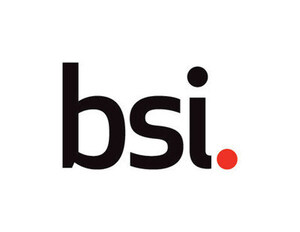HERNDON, Va., July 30, 2024 /PRNewswire/ -- American, Chinese and Indian businesses have a greater level of readiness to smoothly integrate AI into their operations, prepare employees for resulting changes to work and leverage it as a force for good, while the UK, Japan and the Netherlands have greater progress to make in areas including investment, training and supplier engagement, according to BSI's newly-published International AI Maturity Model.
BSI's model weights a suite of measures to come up with a score. It identifies India as the most AI mature market, scoring 4.58 to China's 4.25, with the US a close third, scoring 4.0. Based on insights from 932 business leaders across nine countries and seven sectors, metrics include attitude and actions including around investment, training, internal and external communications and safety. Published as part of BSI's Trust in AI report, the analysis identifies the UK and Japan to be less mature relative to others.
The research identifies gaps between perceptions of what successful AI adoption entails and concrete steps being taken. 76% of international business leaders think organizations will be at a competitive disadvantage if they do not invest in AI. Yet 30% felt not enough was being invested by their businesses in AI tools. Similarly, while 89% felt offering training to ensure safe, ethical and effective use was important and 87% felt businesses should train teams to utilize AI tools in order to protect jobs, only a third reported substantive awareness of their company offering such training.
AI engagement is high everywhere, yet there are variances around how businesses are involving employees. Leaders in the US (59%) and Germany (55%) place high importance on involving employees in testing and trialling AI tools, compared with only 31% in the UK. Similarly, two thirds of US business leaders say it is a high priority to inform employees about AI use, dropping to 24% in Japan and 36% in the Netherlands.
Susan Taylor Martin, CEO, BSI, said: "BSI's International AI Maturity Model paints a positive but nuanced picture of a world excited about AI's potential and its promise as a force for good. Some countries and some sectors are pulling ahead while for others there is a journey still to go on to build trust and confidence. Investment in standards, training and assurance is key as AI becomes integral to the future of life and work.
"While the Model shows diverging paths thus far on AI, its mass adoption and integration into work and life is a marathon, not a sprint. Success is not about being first, but about building trust. BSI is committed to playing a role in shaping the guardrails for the safe and ethical use of AI, which will help businesses globally respond to embrace AI to build a positive future for all."
Under half of businesses have an AI strategy (44%) – falling to just 28% in the Netherlands and 21% in Japan, although this is much higher in the US and China (54% and 60% respectively). More positively, 93% globally recognize the importance of an ethical approach to AI. BSI recently published the first international AI management system standard (BS ISO/IEC 42001), along with a package of measures designed to enable the safe, secure and responsible use of AI. However only one in three (29%) were aware of significant moves by their business to implement such policies.
BSI also explored where leaders see scope for AI, with 55% saying the key opportunity is around improving productivity and efficiency, followed by improved customer service (46%). A quarter see it as a tool to reduce reliance on contractors or consultancies, while 38% expect AI to support the management, measurement and reporting of sustainability goals, and 40% expect to use it to support cybersecurity. Just 31% anticipate AI changing or replacing specific job functions.
There are clear differences between sectors. Healthcare trails with 40% saying their employer is not currently investing in AI – compared with just 4% in technology roles. This is despite a high level of optimism within healthcare for AI to improve efficiency and productivity (62%) compared with more tentative responses from transport (51%), retail (53%) and agriculture (46%).
The research finds 83% globally recognize the importance of informing their supply chain about AI use, however, only a third say their business is providing a significant volume of such information. Just 26% are informing customers about their AI usage to the same extent.
The vast majority, in all markets and sectors, believe businesses should support innovation in society, with strong recognition for the role they play to inspire trust in AI in their wider ecosystem. Two thirds (65%) agree innovation is more important than protecting existing jobs.
BSI's research draws together four key takeaways exploring how businesses can act to shape trust in AI across their ecosystems and wider society, so AI can be realized as a force for good.
- Think long-term: Look at AI as part of your wider business strategy - once the foundations are in place, businesses can optimize and evolve their AI strategy as technology advances.
- Businesses and policymakers should collaborate across borders: Innovate with AI, but to do so safely. Alongside regulatory routes, cross-border collaboration can offer necessary protections.
- Move from intention to action: Instil trust in AI by clarifying priorities and accelerating progress.
- Lead and inspire: Set the standard for our AI future.
Explore the data on BSI's interactive dashboard.
CONTACT: Jennifer Lipman, [email protected]
SOURCE BSI

WANT YOUR COMPANY'S NEWS FEATURED ON PRNEWSWIRE.COM?
Newsrooms &
Influencers
Digital Media
Outlets
Journalists
Opted In





Share this article